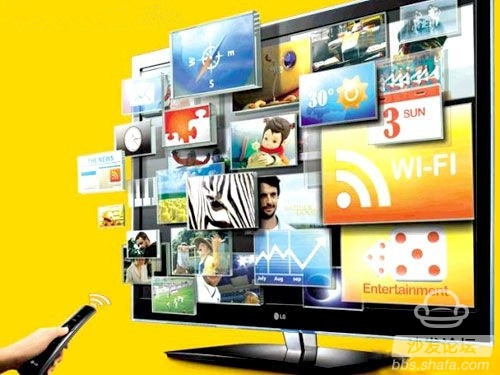
In recent years, television has been moving towards the direction of networking and intelligence. As a result, many new names and concepts have emerged. What IPTV, Internet TV, Internet TV, and smart TV seem to come out at once, and most consumers can't distinguish between their respective meanings. In fact, there are many ambiguities because these names are not initially defined.
In the past, television was the most important way for family leisure and entertainment. It was a habit for people to watch regular programs in front of the TV. However, with the rise of the Internet and mobile Internet, users feel the new feeling of watching and choosing to watch at any time. The loyal audience of many televisions has gone online, and TV has been facing difficulties for some time.
The number of users viewing traditional TVs has decreased a lot. In order to re-engage users, TVs have begun to learn the advantages of the Internet and smart machines, and began to implement video-on-demand and webcasting through channels of broadband Internet. In addition, the television also added an intelligent system that can complete web browsing, application installation, voice chat and other functions.
With the continuous emergence of new types of televisions, many manufacturers are also discovering new competition points and rushing to launch new television sets with network functions and intelligent functions. However, the concept of the product was not strictly defined at first, and each manufacturer said it himself, leading to the fuzzy concept in the market.
In addition, on the Internet, there are also live television viewing programs. Users only need to be able to directly watch the vast majority of content on the television through the Internet. This way of watching TV on the Internet has also become an Internet TV. Such concepts as IPTV, Internet TV, Internet TV, and smart TV are very easy to mislead users.
In fact, IPTV, Internet TV, and Internet TV have more emphasis on service and viewing methods. They also have hardware carriers, but they actually refer to intrinsic services; while smart TVs refer to TVs with intelligent systems, emphasizing peripheral hardware. . The following Xiaobian analyzes these concepts one by one.

IPTV (Internet Protocol Television, English: Internet Protocol Television)
IPTV (Internet Protocol Television, English: Internet Protocol Television) is a system that uses broadband network (broadband) as a medium to transmit television information. It broadcasts broadcast programs to subscribers through a broadband Internet protocol. Due to the need to use the Internet, IPTV service providers often provide related services such as connecting to the Internet and IP phones.
In fact, in terms of technical principles, IPTV is actually a form of watching TV on a broadband network. However, in China, IPTV has a distinct uniqueness due to its unique operating model. The main IPTV operators in China are telecom operators (Telecom, Unicom, etc.), and are telecom value-added services dominated by telecom operators to watch video programs on private networks through home broadband.
Users cannot install and use IPTV independently, and they need to pay the telecom operators a value-added service fee to receive the content. Compared with traditional cable television, it only replaced the channels for receiving signals from cable TV lines to broadband cable. The object of paying TV service fees has changed from cable radio and television bureaus to telecom operators.
From a formal point of view, IPTV requires the addition of a set-top box designated by the operator in addition to the broadband network. Access the specified content platform through the specified set-top box connection network. Several Internet TV licensees (Shanghai BesTV, Hangzhou Hua, CNTV, etc.) provided on-demand and live broadcast content.
IPTV is more as an add-on product for home telecom operators' broadband. And home broadband, home phone and other products packaged sales. In the initial IPTV overall design, all IPTV set-top boxes generally can only connect to service-specific networks and cannot access the public Internet. Therefore, the content of IPTV is much less liberal and open than current Internet TV. However, compared to traditional cable TV, IPTV, which can provide on-demand video, live broadcast, and look-back services, is still very advantageous.
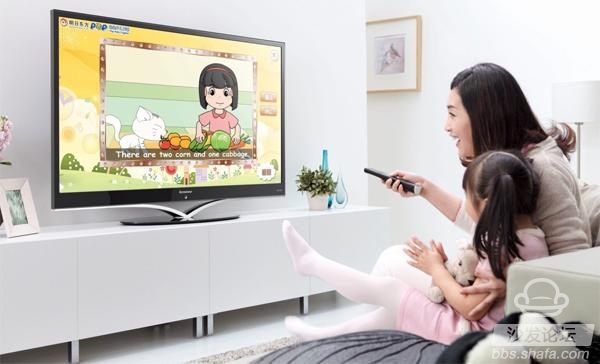
Network television/Internet television
Internet TV and Internet TV are actually the same concept, but they only have abbreviation and full name. We say that the networks in general also refer to the Internet and are short for the Internet. Although the concept of “Internet TV†has many kinds of meanings, there are also many kinds of references, but in almost all cases, Internet TV and Internet TV can be replaced with each other.
The original "Internet TV" refers to the form of live television broadcast on the Internet. We usually use PPS, PPTV and other clients on the computer or watch live webcasts directly on webpages. In fact, we watch online TV. From now on, watching TV live on the Internet has been very common. But the connection between the content of television and the Internet has not been so smooth. The ability to watch TV live over the Internet has become amazing, and it was given the name of the Internet TV.
However, in order to grab back the audience, the television also began to accept some content of the Internet. Initially, many television manufacturers have tentatively launched televisions that can connect directly to cable and obtain information and video content over the Internet. But at the time, smart TVs had not yet emerged. These televisions did not have smart systems and were named after "Internet TV" or "Internet TV." Therefore, Internet TV will have more than one such meaning.
However, in the era of rampant smart TV, there are still some manufacturers who advertise their TV products as Internet TV. At this time, Internet TV no longer refers to products that do not have an intelligent system and only have network functions. It refers to smart TVs that focus more on Internet functions or on Internet functions.
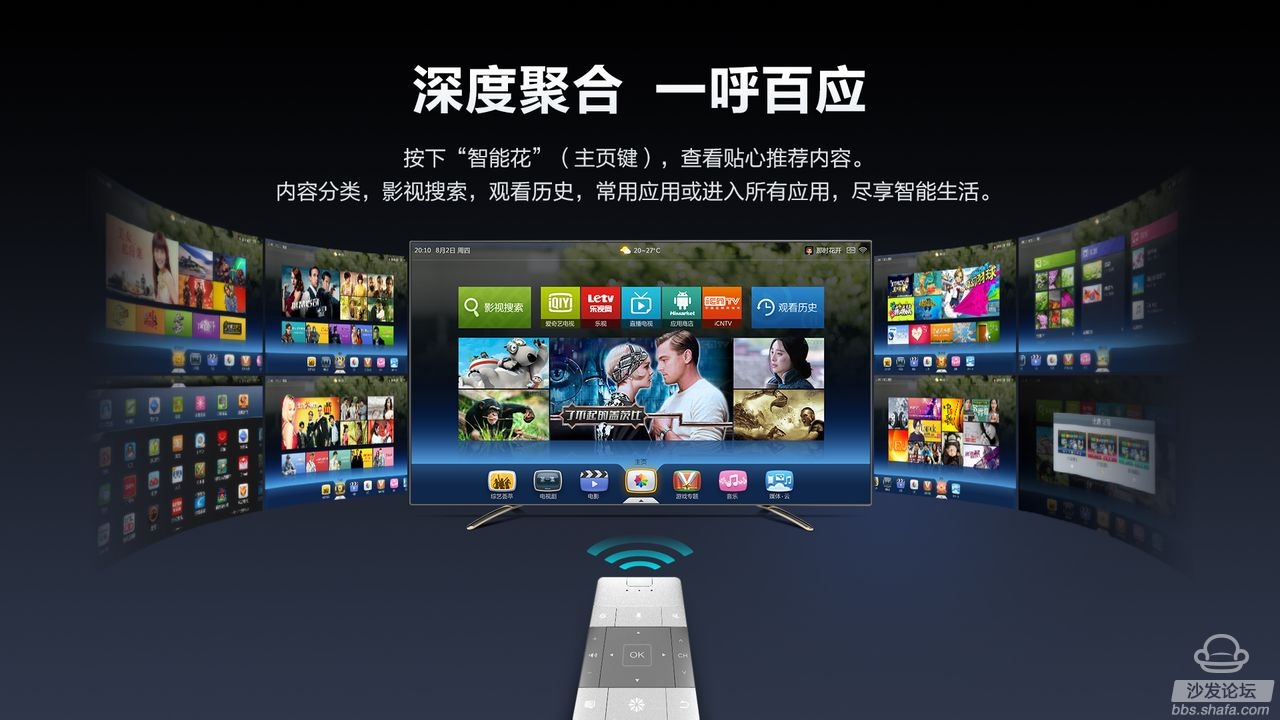
Smart TV
Different from the previous concepts, smart TV mainly refers to televisions with rich intelligent functions, focusing on actual products. From the hardware point of view, a smart TV is a TV with an intelligent module and an intelligent system. It is a combination of the computing processing part and the television display part. From a functional point of view, in addition to watching normal TV programs, smart TVs can also achieve web browsing, video on demand, application installation, smart control, and human-machine interaction.
However, the function of smart TVs is no longer limited to the provision of television programs for users, but the transition from watching television to using television. In addition to video programs, games, interactive education, home entertainment, etc. have great room for development, such as browsing photo albums, playing music, video calls, various games, family KTVs, and so on.
to sum up:
The concepts of IPTV, Internet TV, Internet TV, and smart TV are changing due to the emergence of new things and the impact of current trends. As far as the current situation is concerned, IPTV still refers to a form in which telecommunication operators mainly watch programs through broadband networks; Internet TV and Internet TV contain two meanings; one is the way of watching live TV on the Internet, and the other is This is a smart TV with internet capabilities. The concept of a smart TV is relatively simple. It is a TV product that has a smart operating system and can realize rich smart functions.
PLC Splitters are Single Mode Splitters with an even split ratio from one input fiber to multiple output fibers. Available split counts are 1x4, 1x8, 1x16, and 1x32. Fiber Optic PLC Splitter is available with 900µm loose tube single mode fiber and terminated or unterminated as per your needs. Unconnectorized PLC splitters come with no connectors for easy splicing or connectorization. Connectorized PLC Splitters are available with your choice of Fiber Optic Connectors: LC/UPC, LC/APC, SC/UPC, SC/APC, FC/UPC, FC/APC, and ST/UPC.
Planar lightwave circuit splitter is a type of optical power management device that is fabricated using silica optical waveguide technology. It features small size, high reliability, wide operating wavelength range and good channel-to channel uniformity, and is widely used in PON networks to realize optical signal power splitting. Bwinners provides whole series of 1×N and 2×N splitter products that are tailored for specific applications. All products meet GR-1209-CORE and GR-1221-CORE requirements.
We provide the whole series of 1xN and 2xN splitter products that are tailored for specific applications. Fiber Optic Splitter Plc, Fiber Optic Cable Splitter, Optical Splitter, Mini Type Plc Splitter, Cassette Type Plc Splitter, Insertion Module Plc are available.
Features:
Low insertion loss and low PDL
Various coupling ratio
Environment stable
Single mode and multimode available
High Reliability and Stability
High Channel counts
Wide wavelength range
Customized packaging and configuration
Applications:
FTTx Construction
Fiber Optical communication system
Fiber Optical access networks
Fiber Sensor
Fiber CATV networks
Local area networks
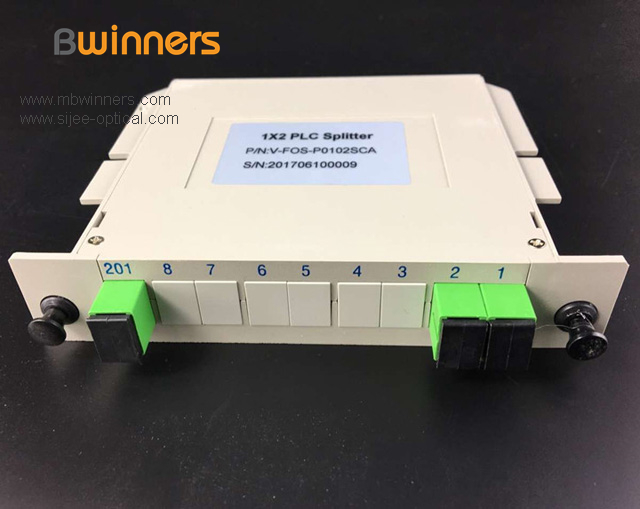
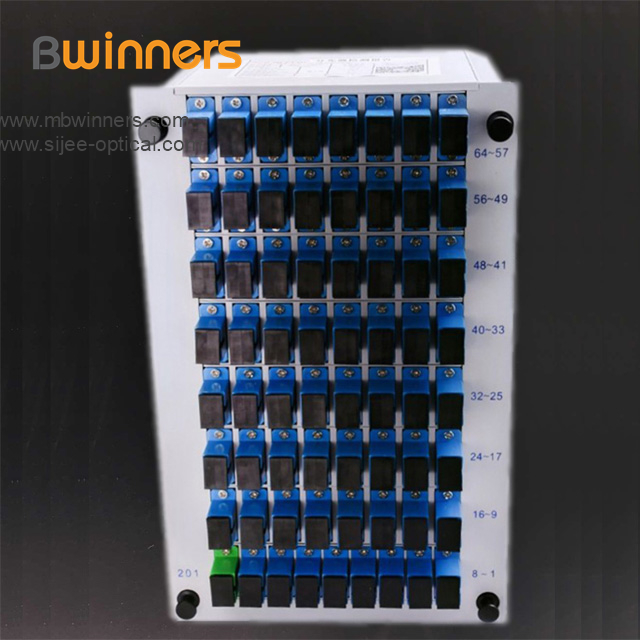
Insert PLC Splitter Module,SC APC Splitter,Plc Optical Splitter,Fiber Optic Splitter Coupler
Sijee Optical Communication Technology Co.,Ltd , https://www.sijee-optical.com